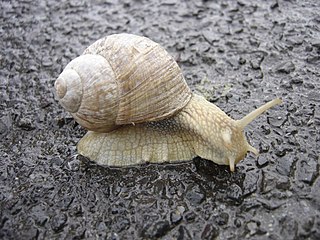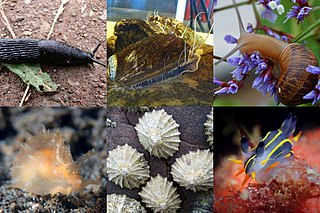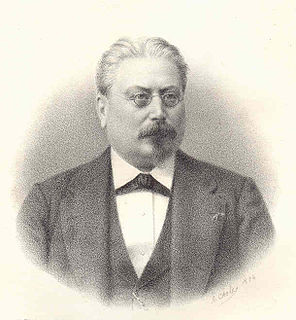
A snail is, in loose terms, a shelled gastropod. The name is most often applied to land snails, terrestrial pulmonate gastropod molluscs. However, the common name snail is also used for most of the members of the molluscan class Gastropoda that have a coiled shell that is large enough for the animal to retract completely into. When the word "snail" is used in this most general sense, it includes not just land snails but also numerous species of sea snails and freshwater snails. Gastropods that naturally lack a shell, or have only an internal shell, are mostly called slugs, and land snails that have only a very small shell are often called semi-slugs.

The gastropods, commonly known as snails and slugs, belong to a large taxonomic class of invertebrates within the phylum Mollusca called Gastropoda.

The family Sciomyzidae belongs to the typical flies (Brachycera) of the order Diptera. They are commonly called marsh flies, and in some cases snail-killing flies due to the food of their larvae.

The snail kite is a bird of prey within the family Accipitridae, which also includes the eagles, hawks, and Old World vultures. Its relative, the slender-billed kite, is now again placed in Helicolestes, making the genus Rostrhamus monotypic. Usually, it is placed in the milvine kites, but the validity of that group is under investigation.

Alcide Charles Victor Marie Dessalines d'Orbigny was a French naturalist who made major contributions in many areas, including zoology, palaeontology, geology, archaeology and anthropology.

Cornu aspersum, known by the common name garden snail, is a species of land snail in the family Helicidae, which includes some of the most familiar land snails. Of all terrestrial molluscs, this species may well be the most widely known. It was classified under the name Helix aspersa for over two centuries, but the prevailing classification now places it in the genus Cornu.

Lissachatina fulica is a species of large land snail that belongs in the subfamily Achatininae of the family Achatinidae.

The red-rimmed melania, scientific name Melanoides tuberculata, is a species of freshwater snail with an operculum, a parthenogenetic, aquatic gastropod mollusk in the family Thiaridae.

Cone snails, cone shells, or cones are a large group of small- to large-sized extremely venomous predatory sea snails, marine gastropod molluscs.

Physella acuta is a species of small, left-handed or sinistral, air-breathing freshwater snail, an aquatic gastropod mollusk in the family Physidae. Common names include European physa, tadpole snail, bladder snail, and acute bladder snail. In addition, Physa acuta, Physa heterostropha and Physa integra are synonyms of Physella acuta.
Theodoxus fluviatilis, common name the river nerite, is a species of small freshwater and brackish water snail with a gill and an operculum, an aquatic gastropod mollusk in the family Neritidae, the nerites.

Elona quimperiana, common name the escargot de Quimper, is a species of air-breathing land snail, a terrestrial pulmonate gastropod mollusk in the family Elonidae.

A land snail is any of the numerous species of snail that live on land, as opposed to the sea snails and freshwater snails. Land snail is the common name for terrestrial gastropod mollusks that have shells. However, it is not always easy to say which species are terrestrial, because some are more or less amphibious between land and fresh water, and others are relatively amphibious between land and salt water.

Jacques Philippe Raymond Draparnaud was a French naturalist, malacologist and botanist.

Conus textile, the textile cone or the cloth of gold cone is a venomous species of sea snail, a marine gastropod mollusk in the family Conidae, the cone snails, cone shells or cones. Textile cone snails live mostly in the Indian Ocean, along the eastern coast of Africa and around Australia.

Otala lactea, known as the milk snail or Spanish snail, is a large, edible species of air-breathing land snail, a terrestrial pulmonate gastropod mollusk, in the family Helicidae, the typical snails.

Jules René Bourguignat was a French malacologist, a scientist who studied mollusks. He served as secretary-general of the Société malacologique de France. During his lifetime, he traveled widely, visiting, for example, Lake Tanganyika and North Africa. He reportedly defined 112 new genera and around 2540 new species of mollusks.

Freshwater snails are gastropod mollusks which live in fresh water. There are many different families. They are found throughout the world in various habitats, ranging from ephemeral pools to the largest lakes, and from small seeps and springs to major rivers. The great majority of freshwater gastropods have a shell, with very few exceptions. Some groups of snails that live in freshwater respire using gills, whereas other groups need to reach the surface to breathe air. In addition, some are amphibious and have both gills and a lung. Most feed on algae, but many are detritivores and some are filter feeders.

Lotoria lotoria, common name the black-spotted snail or washing bath triton, is a species of predatory sea snail, a tropical marine gastropod mollusc in the family Cymatiidae. This species was previously known as Cymatium lotorium.

Alecton discoidalis is a species of firefly in the beetle family Lampyridae, commonly known as the Cuban endemic firefly. The larvae of this species are predators on both pulmonate and operculate land snails. Alecton discoidalis is the type species of the genus Alecton.



















